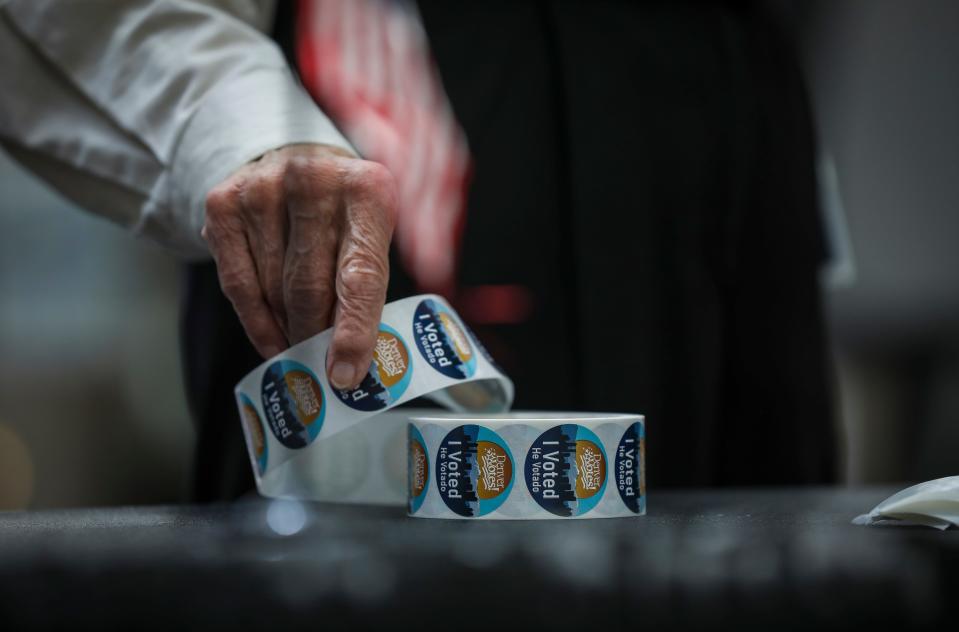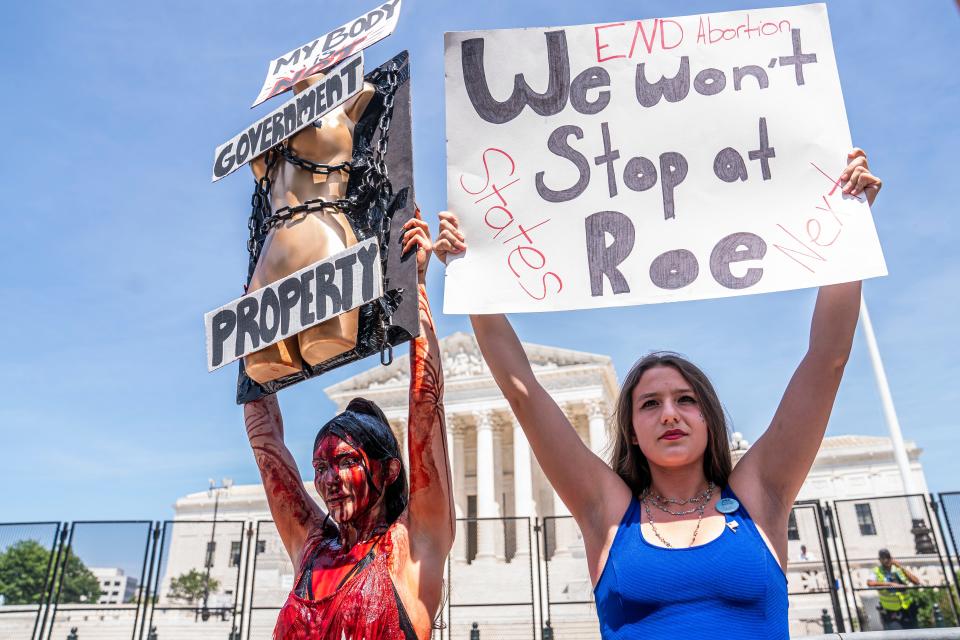How an upcoming Supreme Court case could upend 2024 election laws, lawsuits
- Oops!Something went wrong.Please try again later.
Correction: An earlier version of this story misstated which president nominated Associate Justice Anthony Kennedy. It was President Ronald Reagan.
WASHINGTON – Months before voters went to the polls to choose a president in 2020, a handful of state courts stepped in to make it easier to cast an absentee ballot in response to the COVID-19 pandemic. More often than not, those decisions were supported by the U.S. Supreme Court.
That could change by the time voters line up again in 2024.
The nation’s highest court will consider a bombshell appeal this fall that legal experts say could fundamentally change how federal elections are run, giving state legislatures more power to set voting rules, draw congressional districts and choose slates of presidential electors with less oversight from courts.
Noting that Republicans control a majority of state legislatures, progressives are alarmed over what they see as a coordinated effort to disenfranchise voters and benefit the next GOP presidential nominee. Conservatives counter that some state courts exceeded their authority in 2020 and that elected lawmakers are best positioned to decide how elections should be run.
Citizenship: Arizona could be model for states to require proof of citizenship to vote
A long march: Overturning Roe a triumph of decades long push by conservatives
'New territory': Supreme Court ends term with shift to the right on abortion, guns
The case arrives at a moment when the court's 6-3 conservative majority appears eager to flex its muscle, even if that means overturning precedent supported by a majority of the country. It also comes as polls show Americans are losing faith in elections after years of hearing false claims of widespread fraud from former President Donald Trump and his allies.
"We're in a different era now that we really opened the door to – however you want to think about it – manipulating or changing the election law in ways that seem designed to advantage one side," said Michael Kang, a law professor and elections expert at Northwestern University. "Knocking this barrier down is probably meaningful, but we don't know how impactful it’s going to end up being."
At the center of the dispute is a clause in the Constitution that delegates responsibility for federal election rules to the "legislature" of each state subject to oversight by Congress. Conservatives say the plain meaning of the founding document is that state legislatures – and only state legislatures – have the power to set those rules. That reading of the clause would cut governors, election officials and state courts out of the rulemaking process.
The North Carolina Legislature approved a congressional map on Nov. 4, 2021. Three months later, the state's Supreme Court struck down that map – which would have given Republicans control of at least two additional House districts. A state court appointed three experts to draw a new map, which it later adopted. Republicans appealed to the state Supreme Court, but their request was denied.

In their appeal to the U.S. Supreme Court, state GOP lawmakers say courts never should have gotten involved in the first place. A spokeswoman for North Carolina House Speaker Tim Moore did not respond to a request for comment.
The Supreme Court considered a similar argument only seven years ago and rejected the view that the term "legislature" is so narrowly defined. Arizona lawmakers sued over an independent redistricting commission voters created through a ballot initiative in 2000. The commission, the lawmakers claimed, violated the elections clause. But a 5-4 majority of the Supreme Court ruled the framers had a more expansive definition of the word.
The word "legislature," Associate Justice Ruth Bader Ginsburg wrote for the majority, meant something broader than just the legislative body. It meant a state’s general power to make laws. Interpreting the clause as granting the state legislature sole power to make election laws, she wrote, would be "perverse."
That majority included the court's liberal bloc – then four strong – along with Associate Justice Anthony Kennedy, a swing vote nominated by President Ronald Reagan. Today, Kennedy and Ginsburg are gone. And with a six-vote conservative majority, the era of a swing vote tipping major cases involving questions of political power appears to be over.
At least four conservative justices have already signaled varying levels of interest in the idea of giving legislatures more power, embracing what's known as the independent state legislature doctrine. Associate Justice Brett Kavanaugh said that the North Carolina lawsuit presented an "important" questions and that "both sides" had "advanced serious arguments." Kavanaugh and Chief Justice John Roberts have long been viewed as near the ideological center of the court. Both were in the majority in 95% of cases this term, statistics compiled by SCOTUSblog show.

The question, Kavanaugh wrote in March, "is almost certain to keep arising until the court definitively resolves it," and he encouraged his colleagues to do so.
State and federal courts stepped in repeatedly during the 2020 election. At a time when the U.S. Postal Service was experiencing delivery delays, a Pennsylvania court ruled that absentee ballots could still be counted even if they arrived three days after the election. The U.S. Supreme Court declined to halt that ruling. Despite Trump's protests, the number of ballots at issue were not enough for him to win the Keystone State.
A federal district court ruled that absentee ballots in Wisconsin could arrive after the polls closed as long as they were postmarked by Election Day. But a 5-3 majority of the Supreme Court rejected that decision days before the 2020 election. Biden carried Wisconsin by more than 20,000 votes.
2024: Supreme Court to hear redistricting suit with deep for federal elections
Chief: Roberts wanted to go slow curbing Roe v. Wade. His colleagues were in a hurry.
If the Supreme Court had embraced the independent state legislature doctrine before the 2020 election, it likely wouldn’t have changed the outcome. But it may have affected hundreds of lawsuits that were filed across the country.
"The election would have looked very different" if the Supreme Court had embraced the legal theory the North Carolina lawmakers are pushing, said Suzanne Almeida, redistricting and representation counsel for Common Cause. "The scariest piece is that this is a fundamental reimagining of the relationship between state courts, state constitutions and state legislatures that is more likely to undermine the will of the people being upheld."
Conservatives see it differently. They say that liberal interests have filed lawsuits to subvert the political process and that some courts have been willing partners.
"There are some real questions and I think some pretty naked attempts, particularly from groups on the left, to just try to get courts to play that policymaking function," said Jason Snead, executive director of the Honest Elections Project, a group that advocates for stricter voting laws across the country.
"The court is recognizing this issue is not going away," Snead said. "And maybe it would be better to resolve this question before you're in the middle of a presidential election cycle."
Contributing: Rick Rouan
This article originally appeared on USA TODAY: Supreme Court considers case with major implications for 2024 election

